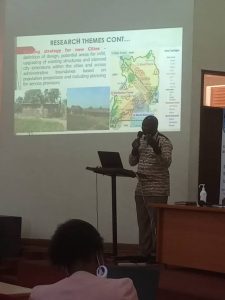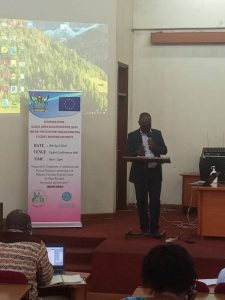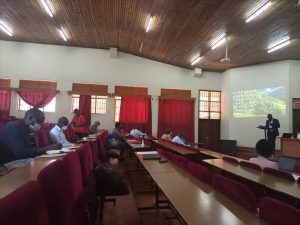On April 8, 2021, Makerere University College of Engineering, Design, Art and Technology (CEDAT) held a full day workshop at the university’s conference center to establish a research team and select themes for research. The meeting was attended by 22 university researchers and professors as well as representatives from the GGGI.
The research topics are in line with the Greening Uganda’s Urbanization and Industrialization project funded by the European Union: project output 1.4 on establishing a knowledge and engagement platform by Makerere University.

To achieve this output, Makerere University commenced its work to establish a top-notch urban research and innovation centre that will be used to support the platform through cutting- edge research to create new knowledge products and provide information for urban leaders and citizens on critical urban sectors such as housing, road, municipal finance, urban farming, urban tourism, industries, urban economy, etc. It will also serve as an incubator and think tank for innovative policies and novel ideas for improved urban planning and management in Uganda and beyond.

This will go a long way in filling the existing research gap and building local capacity to formulate more relevant urban policies and improve the decision-making process at urban sector levels as well as promote the new agenda of city councils as local development agencies in Uganda.
The broad areas of Research areas presented and discussed
- Solid waste management
- Informal sector and green growth: how to strengthen urban economics and new cities
- Eco tourism and local economic development
- Gender and urban greening (inclusion)- must be brought in prominently.
- Urban Agriculture
- Urban crime, violence, – urban safety. How do you reverse crime?
- Housing: – must be included.
- Urban poor- especially disseminating findings.
- Urban green infrastructure vs. urban greening
- Urban governance
- Climate change
- Urban regeneration
- Community participation
- Social inequality
- Urban mobility
- COVID19 and space used
- Slum restoration and settlements
The research committee shall come up with 9 thematic topics from the above list and appoint at least 2 research personnel to each topic.
To kick start the process, the team of researchers focused on selecting research themes related to the GGGI Greening Strategy and establishing a research team by working with MUK experts, the GGGI team, and academic staff. The purpose of this activity was to conduct a consultative meeting of staff members of the department to identify and select appropriate research themes relevant to Uganda’s urbanization and green growth development agenda and there after, establish a credible research team. The action required of MUK is to ensure that the right team is selected and engaged to develop research proposals/projects in line with approved themes.
During the week of April 11-16, a team of 6 researchers will visit the 4 new secondary cities to kickstart their research and identify knowledge and training gaps related to urban and physical planning.
The selected team members are competent in (i) research related to green growth; (ii) sustainable urbanization (management and control); (iii) presentation of the research results during public dialogues in selected secondary cities; and (iv) publication of research results.

However, to effectively implement the platform, GGGI Uganda will ensure that (i) research papers are published on a key knowledge base for the platform; (ii) multi-stakeholder dialogues are conducted to engage key players in the four targeted cities; (iii) short course training modules with their supporting technical manuals are developed to deliver participatory training to new city managers, local leaders, and private sector players as a way of building their capacity.
Today we worked with @MakCEDAT to discuss #research themes related to #urbanization and #industrialization with @EUinUG support. Over 15 #research ideas were shared some related to#wastemanagement #slumdevelopment#environment and #socialsafeguards#gender #inclusivegrowth pic.twitter.com/BTlVg1dJLc
— GGGI Uganda (@GggiUganda) April 8, 2021
#Careergrowth Are you an entrepreneur? Do you have a business or are you interested in starting your own? Courses at #Entrepreneurship Institute of Africa (EIA) are the perfect fit! Register for an account: In your browser –https://t.co/wuNqzdSM4d Deadline is May 8 pic.twitter.com/01C81YK2rM
— GGGI Uganda (@GggiUganda) April 8, 2021